




- BRNN
- BRI News
- BRNN News
- Database
Official Documents Polices and Regulations
Inter-government Documents International Cooperation BRI Countries
Business Guide Economic Data BRI Data
Trade
Investment Projects Latest projects
Cases - Content Pool
Specialty agriculture is a signature calling card and the most distinctive advantage of southwest China's Yunnan Province.
By developing the entire chain from planting to production and sales, Yunnan has enabled its specialty agricultural products to reach broader markets while boosting residents' incomes.
The transformation of the apple industry in Zhaotong city offers a vivid example of the high-quality development of the province's specialty agriculture.
Located in a low-latitude, high-altitude region, Zhaotong maintains an average annual temperature of 11.6 degrees Celsius in its apple-growing areas, with more than 1,900 hours of sunshine annually. These natural advantages have made it China's largest high-quality apple production base in the nation’s south, with its apples selling well in premium fruit markets nationally and internationally.
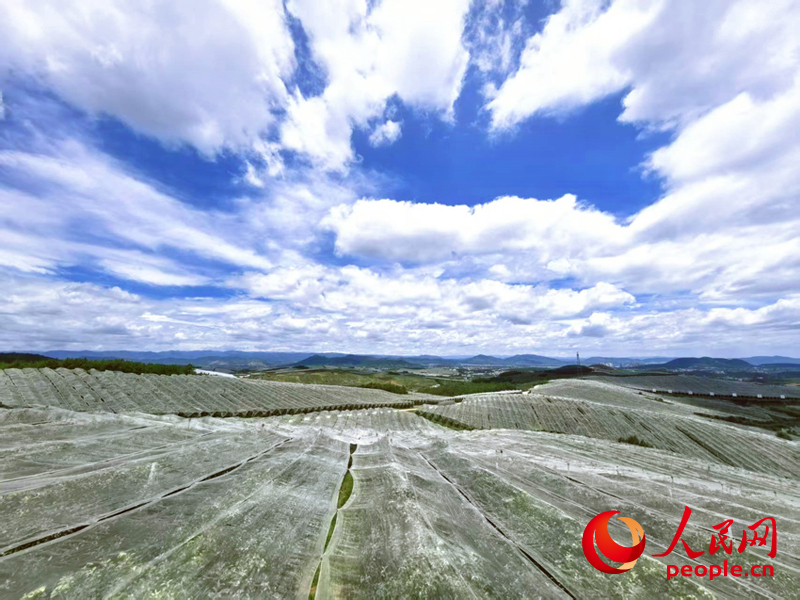
Photo shows hail nets at the country's largest apple orchard applying dwarf rootstocks for denser planting in Zhaotong city, southwest China's Yunnan Province. (People's Daily Online/Sun Haifeng)
To enhance quality, Zhaotong has leveraged its natural resources to reduce pests and disease, increase organic matter in the soil, and develop new foliar fertilizers to strengthen apple trees' immunity, improving both the appearance and taste of the fruit.
Zhaotong is home to the country's largest single apple orchard, utilizing dwarf rootstocks for denser planting, which covers 100,000 mu, approximately 6,667 hectares. Aligning with international standards, the orchard allows tractors to work directly in the fields. Hail nets also help protect the trees from birds and ensure proper light and ventilation. Modern facilities, including integrated water and fertilizer drip irrigation, mechanized management, and plant protection monitoring systems, have raised per-mu yields by 30 percent compared with traditional methods.
With nearly 1 million mu under cultivation, Zhaotong harvested 1.3 million tonnes of apples last year, generating a comprehensive output value of 15 billion yuan, about $2.1 billion, and helping 527,000 people from 138,000 households increase their respective incomes.
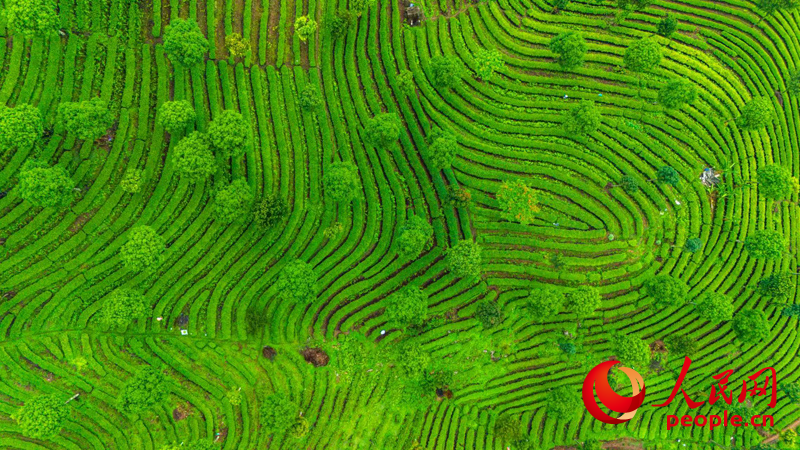
Aerial photo shows an ecological tea garden in Paliang village, Mengma town, Menglian Dai, Lahu and Wa Autonomous County, Pu'er city, southwest China's Yunnan Province. (People's Daily Online/Hu Zunhui)
Across the province, the output value of 14 key agricultural sectors has surpassed 2.5 trillion yuan, with tea, coffee, and nuts ranking first nationally in both cultivation area and output. Yunnan's green and organic products now enjoy strong recognition at home and abroad.
Menglian Dai, Lahu, and Wa Autonomous County in Pu'er city has become known as China's "avocado town." Just years ago, most locals had never even seen or tasted avocados. To foster the industry and share the benefits of development, the county government and leading enterprises created the "334 collaboration model," a profit-sharing mechanism where farmers contribute land for a 30 percent share, enterprises provide seedlings and technology for another 30 percent, and village cooperatives hold the remaining 40 percent.
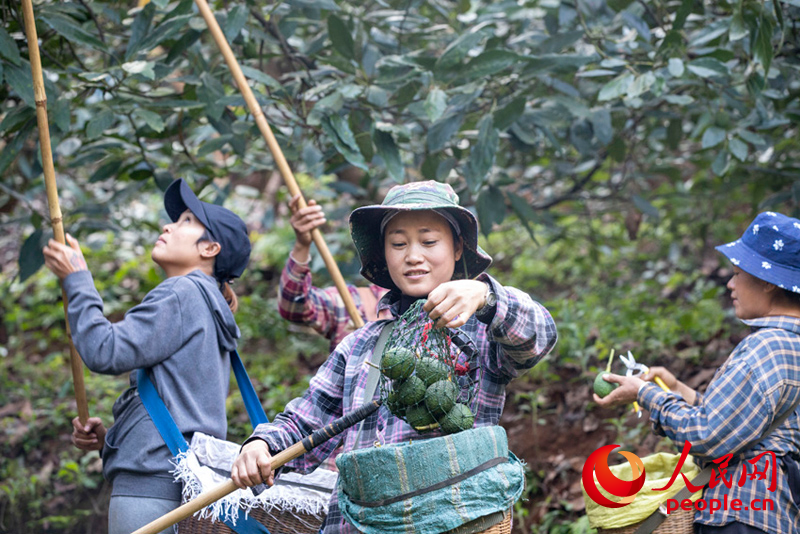
Villagers harvest avocados in Menglian Dai, Lahu, and Wa Autonomous County, Pu'er city, southwest China's Yunnan Province. (People's Daily Online/Hu Zunhui)
Today, Menglian's avocado plantations cover 120,700 mu, accounting for about 80 percent of the national total and replacing 15 percent of imported avocados in the Chinese market.
In addition to the 334 collaboration model in Menglian, Yunnan has introduced other profit-sharing models that closely link smallholder farmers with modern agriculture. In 2024, rural residents' per capita disposable income in the province reached 17,450 yuan, a year-on-year increase of 6.7 percent.
As evening falls at the Dounan Flower Market in Kunming, the provincial capital, crowds of buyers from across China gather to make their selections. As Asia's largest flower trading hub, the market achieved a fresh flower transaction volume of 14.18 billion stems in 2024, with a value surpassing 11.57 billion yuan. It also exported fresh flowers to over 50 countries and regions, including Japan, Singapore, Thailand, Vietnam, and Russia.
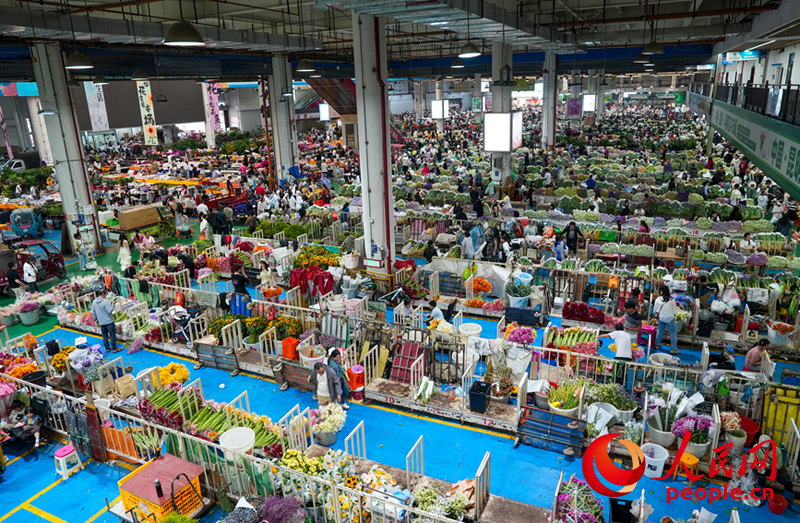
Photo shows the Dounan Flower Market in Kunming, southwest China's Yunnan Province. (People's Daily Online/Hu Zunhui)
At the end of 2024, flower cultivation in Yunnan covered around 1.95 million mu, including 350,000 mu for cut flowers. The province also produced 20.6 billion stems of cut flowers that year, making it the world's largest producer of cut flowers.
Yunnan also boasts about 900 known wild, edible mushroom species, accounting for 91 percent of China's total and 45 percent of the world's total. In Nanhua county, Chuxiong Yi Autonomous Prefecture, known as the "wild mushroom kingdom," a three-tier logistics system connecting counties, townships, and villages has been put in place. Dedicated transport routes to the Kunming Changshui International Airport now allow freshly harvested mushrooms to reach Shenzhen in south China's Guangdong Province in just 12 hours and Shanghai in 13.
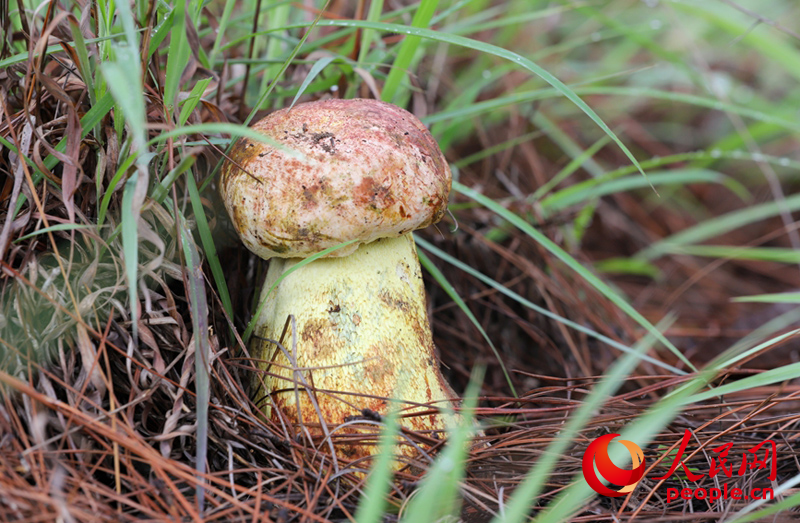
Photo shows a wild mushroom in Nanhua county, Chuxiong Yi Autonomous Prefecture, southwest China's Yunnan Province. (People's Daily Online/Hu Zunhui)
Today, Yunnan is accelerating the development of a modern logistics system. Currently, 70 percent of the province's vegetables are sold to more than 150 cities across China and over 40 countries and regions worldwide.

Tel:86-10-65363107, 86-10-65368220, 86-10-65363106